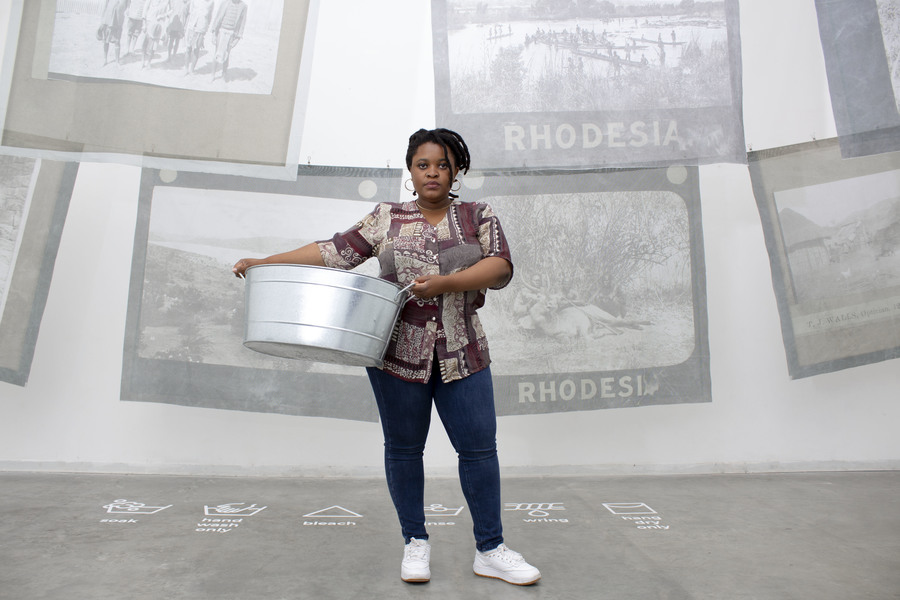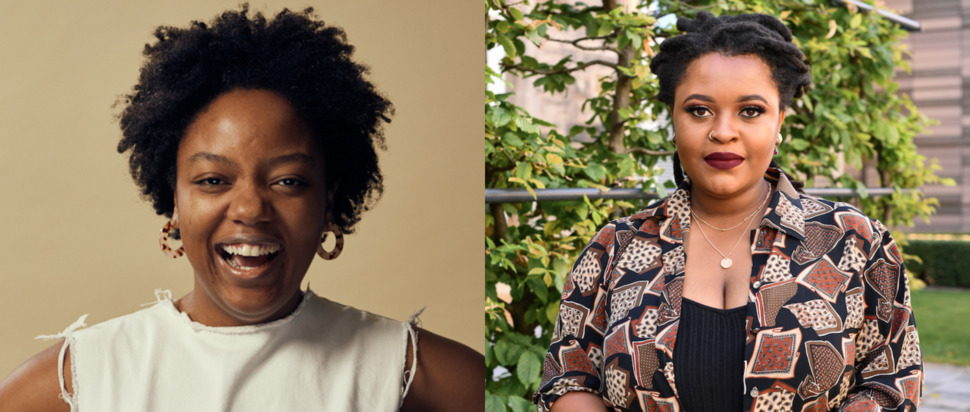The Artist is Present: Briana Pegado and Tanatsei Gambura
Tanatsei Gambura and Briana Pegado, two of Scotland’s leading cultural practitioners, discuss their experience of working in the Scottish creative industries
Briana Pegado’s current body of work, titled The Artist is Mourning, has been evolving since the end of 2021. In this evocative work, she deals with the grief following the loss of her father two years ago, and how this experience of grief intersects with the role of technology in our lives. The work was first exhibited during a self-initiated residency at Sierra Metro (a gallery and co-working space in Leith led by Janine Matheson) and explores the human relationship to death using found footage from Canva.
Pegado thinks through her father’s death and burial, which she experienced over Zoom – an experience that will be familiar to many people who could not physically be with their loved ones due to the social restrictions during the pandemic. The work explores the morality of our relationship to technology in relation to sacred events or rituals, but for her it is also "a love letter to my father, my best friend, and a celebration of his life as well as the questions that his death unearths."
As well as her practice as an artist, Glasgow-based Pegado is also a theta energy healer and psychic intuitive, which she understands as being intrinsically linked to and intertwined with her creative practice. This month, she will perform as part of Shades: A Queer Black Cabaret show at the Macrobert in Stirling and Fruitmarket Gallery in Edinburgh on 13 Oct and 15 Oct respectively. The show accompanies the OMOS (Our Movements Our Stories) exhibition, which has been touring across Scotland for the last year and is currently on display at the Royal Scottish Academy in Edinburgh.

'Hand wash only', by Tanatsei Gambura. Image courtesy of the artist.
Edinburgh and Harare-based Tanatsei Gambura also has an expansive and multi-faceted practice that draws attention to some of the most urgent concerns of our time. She maintains a dual literary and artistic practice, which she describes as informing one another, "like speaking two languages." Her work is grounded in scholarly research, but as a social practitioner she also foregrounds collaboration and exchange. Her practice is concerned with issues of "land, settler-colonial logic, and indigeneity, striving to establish how decolonial artistic research figures as a radical methodology." She also works as a programmer and producer in film exhibition, gallery programmes, and community arts.
In September, she was one of three artists selected to produce a commission for Art Walk Porty, as part of Natasha Ruwona’s residency for the festival titled Endless / Belly. Gambura’s work, titled When We Come Out of the Water, bears witness to the fatal and violent interactions of Black people with bodies of water in the wake of imperial violence, pulling focus to the bodies of enslaved African people in the Atlantic and the contemporary refugee crisis in the Mediterranean simultaneously. Over two days, the public was invited to leave flowers at the Portobello bandstand, an act of communal grieving for the many Black lives lost at sea. The commission also draws attention to the vulnerability of Black and indigenous communities in the unfolding climate crisis.
Gambura is currently working on an exciting commission for the Managing Imperial Legacies project, in collaboration with The University of Edinburgh and other Scottish organisations. She is also leading a Wikipedia Editathon this month, in collaboration with Fruitmarket Gallery, Wikimedia UK and the National Galleries of Scotland, with the aim of "addressing barriers to access and visibility that groups of artists face whilst diversifying Wikipedia’s online archive."

The Artist is Mourning, Part One by Briana Pegado. Image courtesy of the artist.
Both artists are clear about their relationship with arts institutions in Scotland. Pegado describes how, two years ago, she was bullied out of her job at a major arts organisation in Scotland because she reported an incidence of racism. Although this experience will be familiar to people of colour who work in the arts across the UK, it sets a frightening and alarming precedent for the job security and mental health of Black people employed in the creative industries in Scotland. She describes many institutions as still being reliant on "tokenism and placation", instead of "redistributing power to disrupt existing systemic and structural barriers for Black people." Despite her experiences, she continues to work as an anti-racism and governance consultant, but only with institutions that "approach me with respect for my time by way of payment and respect my challenge through fostering a culture of learning."
The treatment of Black women in the UK’s creative industries was put under the spotlight this year with the case of Jade Montserrat, who made allegations of sexual abuse against the art dealer Anthony d’Offay in 2018. It was later revealed that Tate refused an artist’s request to work with Montserrat because of these allegations, with Tate’s director Maria Balshaw reported to have descibed her as "hostile" because of Montserrat’s public critique of d’Offay and Tate. Earlier this year, Tate paid a settlement to Montserrat and two other artists, who had filed a lawsuit against the institution for racial discrimination, harassment and victimisation. This case revealed the extent of institutional racism and abuse that is still business-as-usual and maintains the status quo – an art world that remains predominantly white and male.
Although deep-rooted problems of nepotism, privilege and whiteness remain in Scotland’s creative industries, both artists see positive changes being made in the wake of the pandemic. Gambura notes how much kinder people have been since the onset of the pandemic, and how she’s "received so much understanding from others who are actively making space for people who have diverse needs and atypical rhythms of communicating." Meanwhile, Pegado can see "more money, time, and resources being invested in supporting Black and POC led initiatives", although this investment could go further. She notes the fantastic work of We Are Here Scotland (Pegado co-directed the organisation for a year with current director Ica Headlam), who ran a successful crowdfunding campaign to fund Black creatives and creatives of colour to produce work.
